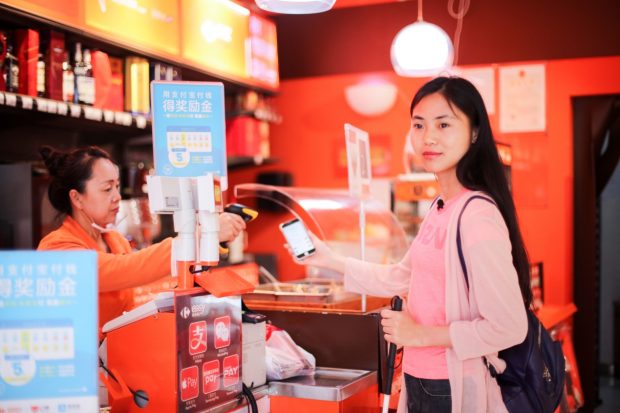Tech business offers way out of massage parlors for millions of visually impaired
Since an accident took away his eyesight at 9 years old, Cai Lei had been told by everyone around him that he could only become a blind masseur when he grew up. But that was not something that appealed to Cai. “Being a blind masseur isn’t the life I wanted. The more people told me that I would have no choice but to be a masseur, the more I rebelled against the idea,” Cai, who hails from Shiping county in Southwest China’s Yunnan Province, told the Global Times. But with few other options, Cai eventually learned massage skills in vocational school and worked as a blind masseur for 10 years in Guangdong and Yunnan provinces.
In 2010, however, Cai successfully broke free from his massage parlor life and started a new, unlikely career – as an IT software tester. He joined Protection & Ease, a Beijing-based company founded in 2008 by Cao Jun, a blind man who had previously run a massage chain in Beijing. The company develops screen reading software for the blind and helps them learn how to use smartphones and computers. It also provides opportunities for masseurs to get a second chance in life by working in IT. By 2008, Cao had opened eight blind massage parlors in China after 13 years of entrepreneurship. Although he offered job opportunities to many blind people, he found that many of them weren’t able to live the life they wanted. “Blind people want to send short messages. They want to read. But these most basic needs couldn’t be met at that time. I felt if I could let computers and mobile phones talk, and make them accessible, I would open a new window for the visually impaired,” Cao, aged 45, told the Global Times.
In 2008, with the savings he earned from his blind massage business, Cao recruited several IT developers and started to develop Chinese-language screen readers for Nokia mobile phones, which was the most popular brand back then. In the years that followed, their business evolved from the Symbian operating systems on Nokia phones to Android systems and to smart home facilities for the blind. Currently, of the over 40 employees at his company, over 30 are visually impaired or blind. Most of them work in sales, after-sales services and software testing. Most of his blind or visually impaired employees have previous experience working in massage parlors, and changing their careers into IT was something beyond the scope of their imagination. Ai Xiaowa, who joined the company in 2010 working in customer services, gained her acupuncture and massage degree at Changchun University in Jilin Province in 2005. After graduation, she worked as a trainer for blind masseurs for several years but never really liked the job.
In 2009, despite strong opposition from her family, she resigned and moved to Beijing, trying to seek new opportunities, before she landed a job in Cao’s company. For Cai and Ai, working at an IT company that helps blind people get access to apps and mobile phones opened up a new world for them. Cai said the changes that smartphones can bring to blind people’s lives are far greater than the changes they bring to sighted people. “For example, calling a taxi is almost impossible for blind people as they can’t see whether there’s a taxi coming. But with car-hailing apps, they can now call a taxi as long as they know how to use the app. Food delivery apps and map navigating apps are also lifesavers for the blind,” he said.
For Ai, part of the difficulty of her job lies in explaining how to use their software to blind people, which can be very testing as most of them have received limited education. According to the latest statistics, of the 85 million disabled people in China, only 1 percent has received higher education, as opposed to 40 percent for non-disabled Chinese. “A lot of blind people stopped learning. They felt that if they need something, they could just ask others to help them. But learning how to use smartphones and computers can really change their destiny,” she said. Cai’s job involves testing the company’s software, collecting user feedback and turning them into Word documents for IT developers to refer to. In addition to visually impaired users, his job also requires him to provide consultations to IT companies that want to make their apps or websites more accessible to the blind and the visually impaired. Recently, he’s been in touch with JD.com, one of China’s biggest e-commerce platforms, which is seeking to optimize its user interface. Cai said while the tech industry in China, as a whole, is more aware of the issue of blind accessibility, the lack of a common standard makes it difficult for them to better tackle the issue. “A lot of tech companies and app developers want to enhance their apps and make them more blind-friendly, but they don’t know where to start,” Cai said.
But many efforts have been made in the past year. Last December, ifeng.com launched a campaign to increase awareness of the importance of access for the blind to mobile phone operating systems and apps and said it will invest 10 million yuan ($1,494,209) to support companies that take efforts to upgrade their systems. Chinese smartphone companies are taking action too. “Xiaomi has established a user feedback chat group with over 450 users who are blind or visually impaired. We will invite them to participate in the development and testing of our new functions in the future to make sure that these functions are accessible to them when they’re launched,” Xue Kang, project manager of Xiaomi’s blind accessibility project, told ifeng.com in December.
By Zhang Yu
(Global Times)


























































